In the fast-paced world of technology, the demand for skilled full stack web developers has never been higher. As businesses strive to establish a robust online presence, the need for professionals who can seamlessly navigate both the front and back ends of web development has become a key priority. If you’re looking to embark on a transformative journey into the realm of full stack web development, you’ve come to the right place.
Welcome to our comprehensive guide on full stack web development course – your roadmap to mastering the intricacies of building dynamic and interactive websites. In this digital age, the ability to seamlessly integrate frontend technologies with backend functionalities is a valuable skill set that opens up a myriad of opportunities. Whether you’re a budding coder, a career switcher, or an experienced developer seeking to enhance your skill set, investing in a top-notch full stack web development course is your gateway to success.
But with a plethora of courses available online, how do you choose the one that aligns with your goals and ensures you stay at the forefront of industry trends? That’s where we come in. In this guide, we’ll unravel the key elements that make a full stack web development course stand out, exploring the essential technologies, hands-on projects, and real-world applications that can catapult you into the elite league of full stack developers.
What is a Full Stack Web Developer?
A Full Stack Web Developer is a professional who possesses a comprehensive skill set to work on both the frontend and backend aspects of web development. In essence, they are capable of handling the entire development process of a web application, from designing the user interface and implementing the user experience on the client side (frontend) to managing the server-side logic, databases, and server configuration (backend).
Here’s a breakdown of the key responsibilities and skills associated with a Full Stack Web Developer:
- Frontend Development:
- HTML/CSS/JavaScript: Proficiency in building the structure (HTML), styling (CSS), and adding interactivity (JavaScript) to the user interface.
- Frontend Frameworks: Knowledge of popular frontend frameworks such as React, Angular, or Vue.js to streamline the development process.
- Responsive Design: Ensuring that web applications are optimized for various devices and screen sizes.
- Backend Development:
- Server-Side Programming: Competence in server-side languages like Node.js, Python, Ruby, Java, or PHP to handle business logic and data processing.
- Databases: Experience with database management systems like MySQL, MongoDB, or PostgreSQL for storing and retrieving data efficiently.
- Server Environment: Setting up and configuring server environments, understanding server-side frameworks like Express.js (Node.js) or Django (Python).
- Version Control/Git: Proficient use of version control systems like Git to manage and track changes in the codebase collaboratively.
- Web Architecture and APIs:
- RESTful APIs: Designing and consuming RESTful APIs for communication between the front end and backend.
- Web Services: Understanding and integrating web services that enhance the functionality of web applications.
- Development Tools and Practices:
- IDEs (Integrated Development Environments): Using tools like Visual Studio Code, Atom, or Sublime Text for efficient coding.
- Testing: Implementing testing strategies, including unit testing and integration testing, to ensure the robustness of the application.
- Deployment and DevOps: Knowledge of deploying applications, configuring servers, and understanding basic DevOps practices.
- Soft Skills:
- Problem-Solving: Adept at identifying and resolving issues in both frontend and backend development.
- Communication: Effective communication skills to collaborate with team members and convey technical information to non-technical stakeholders.
Being a Full Stack Web Developer requires a versatile skill set and a continuous commitment to staying updated with the latest technologies and industry best practices. This role is pivotal in bridging the gap between the visual aspects of a website and the underlying technical infrastructure, making web applications function seamlessly and efficiently.
Why Become a Full Stack Developer?
Becoming a Full Stack Developer offers a multitude of benefits and opens up exciting opportunities in the dynamic field of web development. Here are some compelling reasons to consider pursuing a career as a Full Stack Developer:
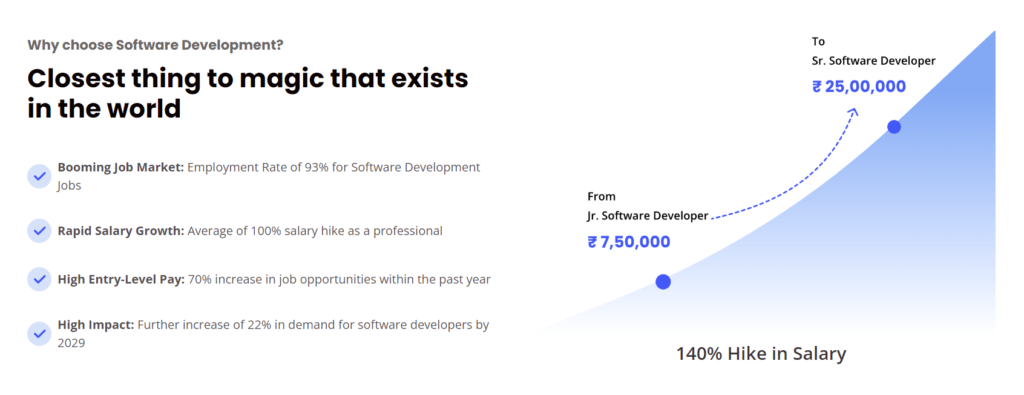
- Versatility and Holistic Understanding:
- Full Stack Developers have a comprehensive understanding of both frontend and backend technologies. This versatility allows them to work on all aspects of a web application, from designing user interfaces to managing server-side logic.
- End-to-End Project Involvement:
- Full Stack Developers are involved in every stage of the development process. This end-to-end perspective enables them to contribute to the entire project lifecycle, fostering a deeper connection with the product they are building.
- Increased Employability:
- With the demand for Full Stack Developers on the rise, possessing skills in both frontend and backend development makes you highly employable. Many companies prefer candidates who can handle various aspects of web development, reducing the need for specialized roles.
- Cost-Efficiency for Startups:
- In startup environments where resources may be limited, having Full Stack Developers who can handle multiple responsibilities is a cost-effective solution. These developers can wear different hats, contributing to different aspects of a project without the need for an extensive team.
- Adaptability to Industry Changes:
- The tech industry evolves rapidly, with new tools, frameworks, and technologies emerging regularly. Full Stack Developers are inherently adaptable and can quickly integrate new technologies into their skill set, staying relevant in a constantly changing landscape.
- Faster Development Cycles:
- Full Stack Developers can streamline the development process by eliminating dependencies between frontend and backend teams. This leads to faster development cycles, quicker iterations, and more efficient problem-solving.
- Better Communication and Collaboration:
- Full Stack Developers bridge the gap between frontend and backend teams, facilitating smoother communication and collaboration. They can understand the perspectives of both sides, leading to more effective teamwork.
- Entrepreneurial Opportunities:
- Full Stack Developers are well-positioned to pursue entrepreneurial ventures. Their ability to conceptualize, design, and implement entire web applications allows them to turn ideas into fully functional products independently.
- Personal and Professional Growth:
- Learning both frontend and backend technologies challenges developers to broaden their skill set. This continuous learning fosters personal and professional growth, making Full Stack Developers resilient in the face of evolving industry demands.
- High Demand in the Job Market:
- The job market consistently seeks Full Stack Developers due to their diverse skill set. This demand translates into a wide range of career opportunities and competitive salaries for individuals with expertise in both frontend and backend development.
Becoming a Full Stack Developer is not just about acquiring a set of technical skills; it’s about gaining a holistic understanding of web development and positioning yourself for a rewarding and dynamic career in the tech industry.
Key Factors to Consider When Choosing a Full Stack Web Development Course:
Choosing the right Full Stack Web Development course is a crucial step toward acquiring the skills and knowledge necessary for a successful career. Here are key factors to consider when making this decision:
- Course Content and Curriculum:
- Comprehensive Coverage: Ensure the course covers both frontend and backend technologies, including popular programming languages, frameworks, databases, and other essential tools.
- Relevance to Industry Trends: Look for courses that teach the latest technologies and industry best practices to stay current with the rapidly evolving field.
- Instructor Expertise:
- Industry Experience: Check the instructor’s background to ensure they have relevant industry experience in full stack development.
- Teaching Reputation: Look for courses with instructors who have a reputation for effective and engaging teaching.
- Practical Hands-On Projects:
- Real-world Applications: The course should include hands-on projects that simulate real-world scenarios, allowing you to apply your skills and build a portfolio.
- Problem-Solving Exercises: The inclusion of coding challenges and problem-solving exercises enhances your practical skills.
- Support and Community:
- Community Interaction: A supportive community or forum where you can interact with instructors and fellow learners is invaluable for getting help and sharing experiences.
- Mentorship Opportunities: Some courses offer mentorship programs, providing additional guidance and support.
- Flexibility and Learning Format:
- Learning Style: Choose a course that aligns with your preferred learning style, whether it’s self-paced, instructor-led, or a combination of both.
- Flexibility: Consider your schedule and choose a course that allows flexibility in terms of timing and deadlines.
- Certification and Recognition:
- Industry Recognition: Check if the course is recognized or endorsed by industry professionals, companies, or organizations.
- Certification: A certification upon completion adds value to your resume and showcases your commitment to learning.
- Cost and Value for Money:
- Cost Consideration: Compare the cost of the course with its offerings, considering factors like instructor quality, course content, and additional resources.
- Free Resources: Some platforms offer free courses or trial periods. Explore these options before committing to a paid course.
- Career Support and Job Placement:
- Career Services: Look for courses that provide career services such as resume reviews, interview preparation, and job placement assistance.
- Alumni Success Stories: Positive testimonials and success stories from course alumni can indicate the course’s effectiveness in preparing students for the job market.
- Technology Stack Focus:
- Relevant Technologies: Ensure the course focuses on technologies that are widely used in the industry, aligning with your career goals.
- Flexibility for Specialization: Some courses allow you to specialize in specific technologies or frameworks. Consider this if you have a particular interest.
- Reviews and Ratings:
- Student Reviews: Check reviews and ratings on independent platforms or forums to gauge the experiences of past students.
- Accreditation: If applicable, check if the course is accredited by educational or industry organizations.
By carefully considering these factors, you can make an informed decision and choose a Full Stack Web Development course that aligns with your learning preferences and career objectives.
Top Full Stack Web Development Courses in 2024:
CAP(Career Accelerator Programme) by Prepleaf Masai-Full Stack Web
Development & Generative AI:
There are many Full Stack Web Development courses available online but we have chosen the full stack web development course from Masai because it offers guaranteed internship and job opportunities. Also, you will get a 100% refund if you don’t get a job offer of 10 LPA or more within one year of completing the course!
Benefits of a Full Stack Web Development Course at Masai School:
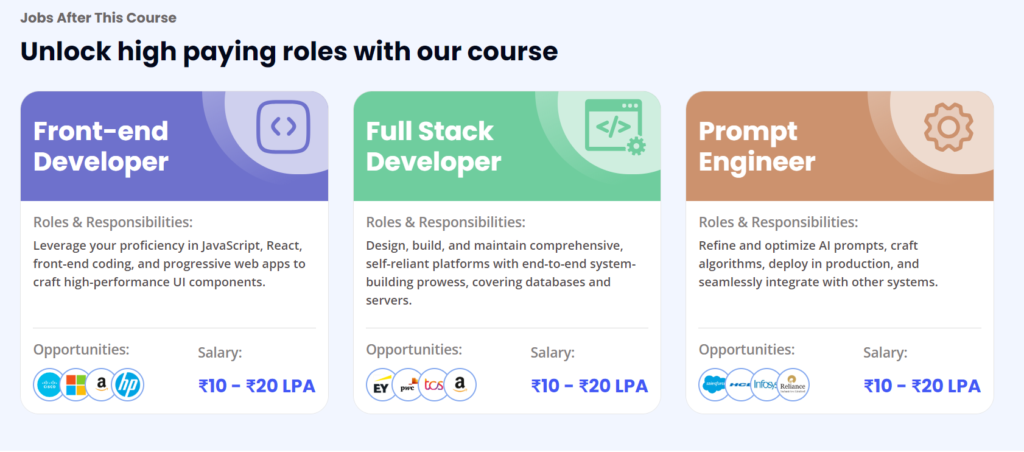
Among the various courses available at Masai School, a full-stack web development course stands out as a comprehensive and highly sought-after program. Here are some benefits of pursuing a full-stack web development course at Masai:
Web Development internship, Freelancing, Job Opportunities, and More:
This program opens doors to internships, freelancing gigs, and job prospects with 4000+ hiring partners. So, if you want to do an internship after completing your course, you can do that.
Also, if you want to make your career in freelancing, you can do that. Also, you will get a 100% refund if you don’t get a job offer of 10 LPA or more within one year of completing the course!
Scholarship Opportunity Based on Performance:
Besides internships, freelancing, and job opportunities, you can earn up to a whopping 120% scholarship based on your performance.
Versatility and Flexibility:
A full-stack web developer is proficient in both front-end and back-end development, making them versatile professionals capable of handling various aspects of web development projects.
This versatility opens up a wide range of job opportunities and allows you to work independently or as part of a team.
It doesn’t matter where you come from, Masai School knows how to get you to your dream career.
Holistic Understanding:
By learning both front-end and back-end technologies, you will gain a holistic understanding of web development. This enables you to create seamless and integrated web applications that offer a superior user experience.
Enhanced Problem-Solving Skills:
Full-stack web development courses emphasize problem-solving and critical thinking skills. You will learn to identify and resolve issues at different levels of web development, making you a valuable asset to any organization.
100% Live Distance Learning:
India’s Only Live Tech-Learning Course With Tier 1 Instructors. Get Real-Time Feedback, Interactive Sessions, and a Personalised Learning Experience.
Generative AI Integrated Program:
Harness and implement the Power Of AI In Coding and Data Analytics. What’s More? Use Custom AI Tools To Enhance Placement Preparation.
Industry Ready Curriculum:
Their Curriculum Is Regularly Updated Through Industry Feedback. In-Demand Specialisations are Added to aid their students in launching sustainable careers.
Focus On Learning Agility:
Masai School prioritizes flexible thinking & continuous skill development. Stay nimble in an ever-changing world by embracing adaptability, curiosity & rapid Learning.
Certification By The N.S.D.C:
NSDC Certification is a prestigious recognition for students who have completed accredited skill-based training programs. It validates their expertise, demonstrating their dedication to practical skills.
This certification provides a competitive edge in the job market, showcasing proficiency and adherence to industry standards. NSDC certifications are widely accepted, unlocking rewarding career opportunities and personal growth.
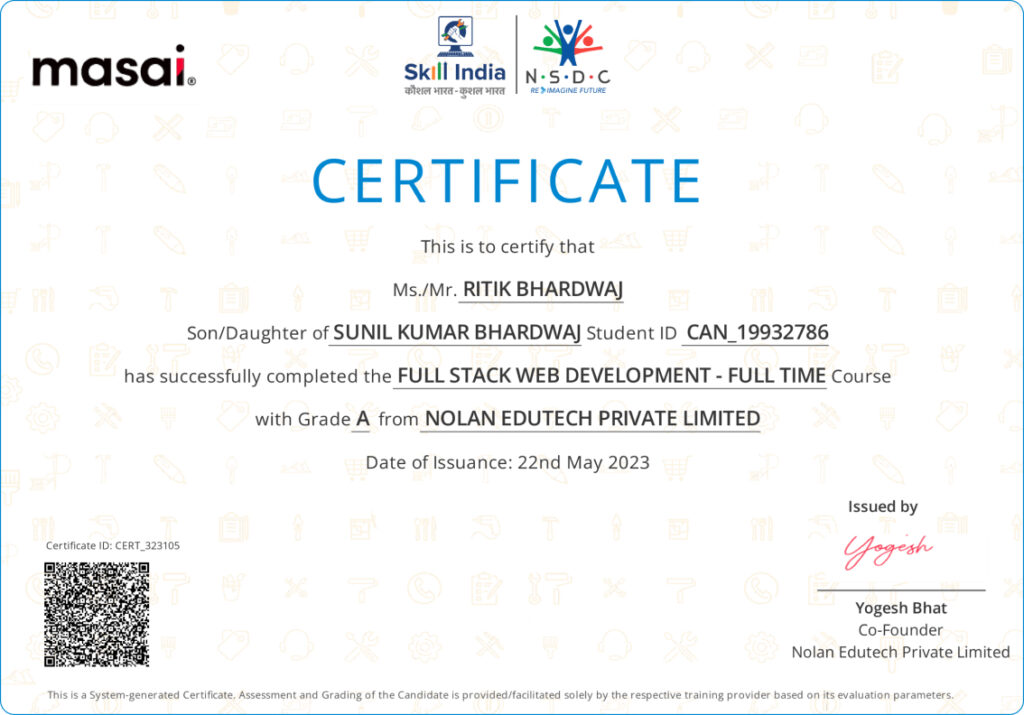
Curriculum and Syllabus of the Full Stack Web Development Course at Masai
The curriculum and syllabus of a web development course play a crucial role in shaping your learning experience. It is essential to choose a course that covers the necessary programming languages, frameworks, and tools used in the industry. Here is the detailed syllabus of the full-stack web development course at Masai.
Module 1: Front-End Web Development
In Module 1, you will learn HTML, CSS, JavaScript, and GitHub. At the end of this module, you will work on some front-end projects based on HTML, CSS, and JavaScript to build your portfolio. This will take approximately 3 months.
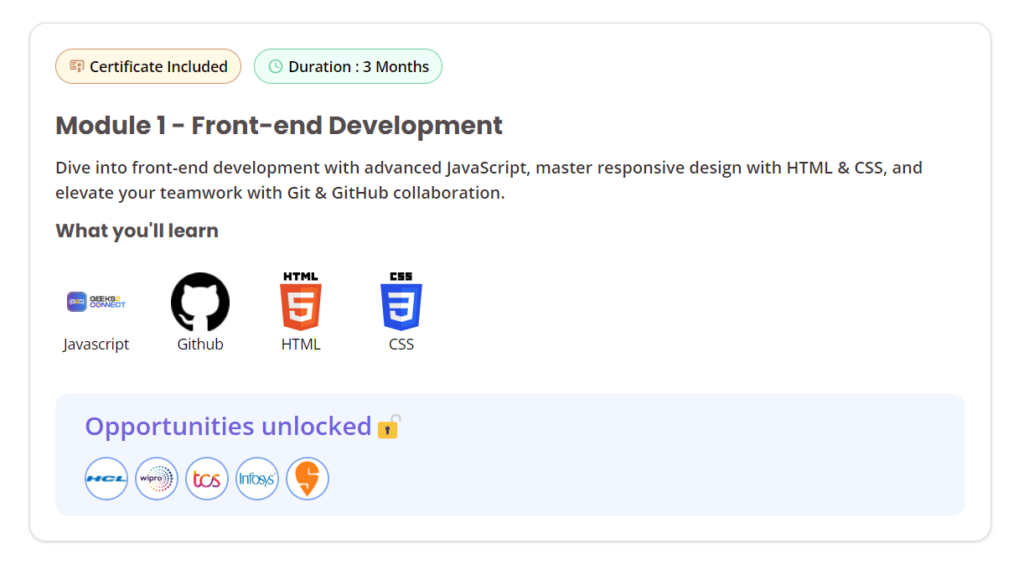
Module 2: MERN Stack Development
In Module 2, you will learn React, Node.js, Express.js, and MongoDB.
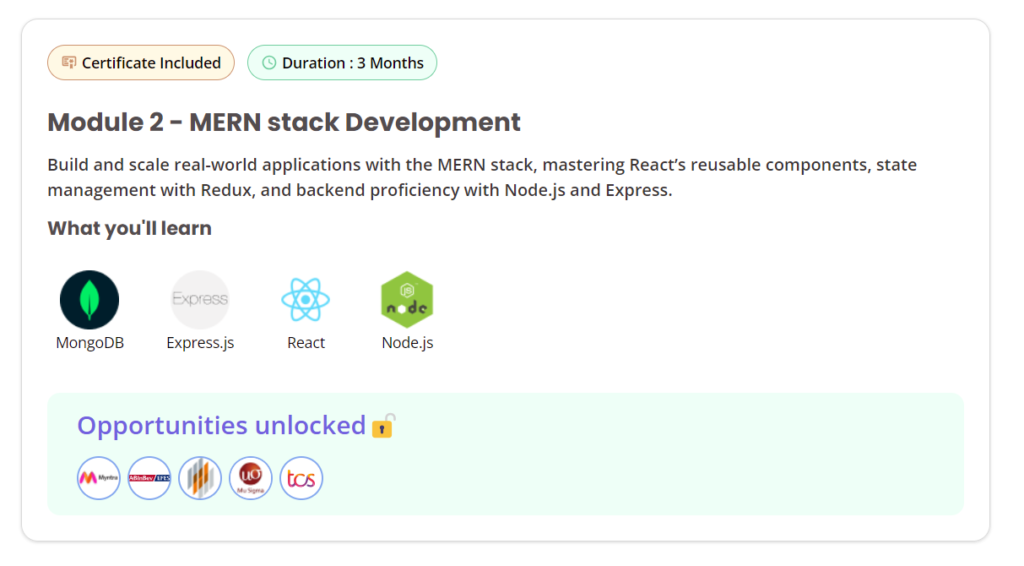
Module 3: GEN AI
Module 3 will help you unleash AI’s potential in web development with GEN AI.

Module 4: Data Structures and Algorithms
In module 4, you will learn Data Structure and Algorithms.

Module 5: Advanced Software Development
In module 5, you will learn about Advance Software Development. You will work on some Capstone Projects. Also, you will learn advanced DSA, advanced React, Node, and Databases.
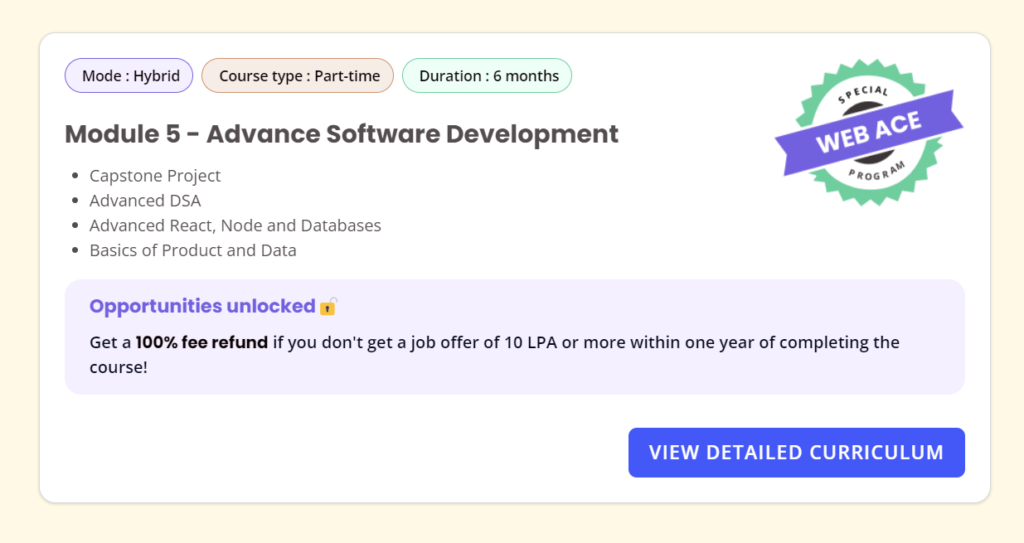
Limited time offer- Save up to 40% on registration fees
Register now with the REFERRAL Code SOUR45 and enjoy an immediate discount of 2000 INR on your registration fees!
Enroll Today for Two Weeks of a Free Trial
Enroll today in the best web development course and unlock your potential in the world of web development. Visit the below link to learn more and kickstart your journey to becoming a skilled web developer.
Don’t forget to enter the Code SOUR45 to get Rs.2000!
Final thoughts on the best Full Stack Web Development Course!
Embarking on the journey to become a Full Stack Web Developer is a transformative decision with the potential to unlock a myriad of opportunities in the ever-evolving landscape of web development. The role of a Full Stack Developer is not merely defined by the mastery of both frontend and backend technologies; it represents a commitment to continuous learning, adaptability, and a holistic understanding of the digital realm.
As technology advances, the demand for Full Stack Developers continues to soar, making this career path a compelling choice for those seeking versatility, increased employability, and the ability to contribute to every facet of web application development. The key factors to consider when choosing a Full Stack Web Development course, ranging from comprehensive curriculum to practical hands-on projects, underscore the importance of a well-rounded education that prepares individuals for real-world challenges.
The journey towards becoming a Full Stack Developer is both rewarding and intellectually enriching. The convergence of frontend and backend expertise not only fosters faster development cycles and efficient problem-solving but also positions developers as invaluable assets in the dynamic and competitive tech industry.
In essence, the decision to become a Full Stack Web Developer is a commitment to a profession that combines creativity with technical prowess, where innovation knows no bounds. As you navigate the vast array of courses and resources available at Masai School, remember that the journey does not end with the completion of the full stack web development course at Masai; instead, it marks the beginning of a career filled with continuous learning, growth, and the exciting prospect of contributing to the ever-changing landscape of web development. So, equip yourself with the right skills, stay curious, and embrace the challenges and triumphs that come with being a Full Stack Web Developer in the digital age. Your journey towards mastering the full stack is just beginning.
Enroll Today for Two Weeks of a Free Trial
Enroll today in the best web development course and unlock your potential in the world of web development. Visit the below link to learn more and kickstart your journey to becoming a skilled web developer.
Don’t forget to enter the Code SOUR45 to get Rs.2000!
FAQs on full Stack Web Development Course
What is a full stack web development course?
A full-stack web development course is a comprehensive program that aims to teach individuals the skills and knowledge needed to work on both the front-end and back-end aspects of web development. Full-stack developers are proficient in various technologies and frameworks, allowing them to build and maintain entire web applications from start to finish.
What is full stack salary?
The salary of a full-stack developer can vary widely based on several factors, including geographical location, level of experience, skills, education, and the specific industry or company. The average salary for a Full Stack Developer in US is $147,100 and in India it is ₹7,25,000 per year.
Which fullstack course is best?
CAP(Career Accelerator Programme) from Masai School is the best. With this course, you will get guaranteed Job Opportunities, Internships, and freelancing Gigs! Also, you will get a 120% scholarship based on your performance.
What is the fee to learn full stack web developer course?
The course fee ranges from ₹10,000/– to ₹4,00,000/– Course fees can vary widely depending on the type of course, the institute or platform offering it, the duration of the course, and whether any additional materials or certifications are included.
Does Google hire full stack developer?
Yes, Google does hire full-stack developers. Google is a large technology company with diverse teams working on a wide range of projects and products. While Google is well-known for its search engine, it is involved in various areas of technology, including cloud computing, artificial intelligence, software development tools, and more.
Google typically hires talented individuals with strong technical skills, problem-solving abilities, and a passion for innovation. Full-stack developers who possess a combination of front-end and back-end development skills, along with a solid understanding of relevant technologies and frameworks, are valuable to companies like Google.
Can a fresher be a full stack developer?
Yes, it is possible for a fresher (someone who is new to the workforce or has minimal professional experience) to become a full-stack developer. While full-stack development involves a broad set of skills, including both front-end and back-end technologies, many entry-level developers successfully transition into full-stack roles.
Is full stack developer a good career?
Yes, becoming a full-stack developer can be a rewarding and fulfilling career choice.
What is the future of full stack?
Predicting the future is tricky, but the “full stack” landscape is constantly evolving, so exploring potential trends can be insightful.
Is full-stack developer a stressful job?
The level of stress in any job, including that of a full-stack developer, can vary based on several factors. Here are some aspects to consider when evaluating the potential stress associated with a full-stack developer role:
1. Project Complexity and Deadlines;
2. Workload and Responsibility;
3. Continuous Learning;
4. Team Dynamics and Collaboration;
5. Flexibility and Adaptability &
6. Work-Life Balance
Is full stack in high demand?
Full-stack developers are in high demand, and this trend is likely to continue. However, please note that the demand for specific skills and roles in the job market can evolve over time
Can I learn full stack in 3 months?
Learning full-stack development in 3 months is an ambitious goal, and the feasibility of achieving it depends on several factors, including your prior experience, the time you can dedicate each day, and the intensity of your learning efforts.
Can a non IT person become full stack developer?
Yes, it is possible for a non-IT person to become a full-stack developer with dedication, time, and effort.
Can a full stack developer earn 20 LPA?
Yes, it is possible for a full-stack developer to earn a salary of 20 LPA (Lakhs Per Annum), especially with a few years of experience and expertise in relevant technologies.
What is the Masai School Referral Code to get a Discount?
Use this code SOUR45 to get up to 40% discount.






